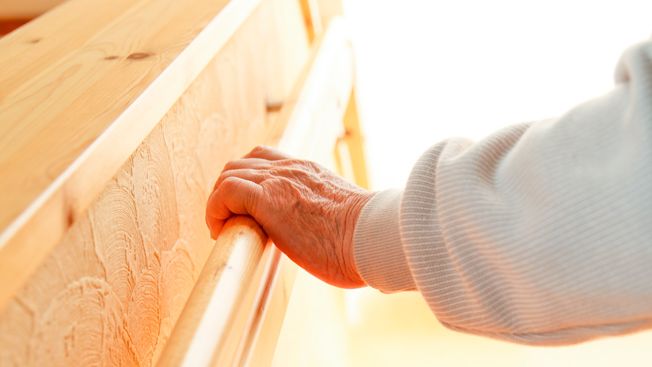5 tips for preventing falls in the home

Statistics show that falls in the home that mean a trip to A&E are often the first step to losing independence and a move into care. Nursing professional Vince Baiera shares his experiences in helping older people to avoid having those falls.
With more than six years’ experience as an ICU Nurse at some of the top hospitals in the USA, such as The Cleveland Clinic and Duke University Hospital, I have seen thousands of patients who struggle with the same problem – mobility!
Every person ultimately will face challenges in their mobility. It’s important to realise that falls are the leading cause of both fatal and non-fatal injuries each year. In 2013, about 25,500 older adults in the USA died from unintentional fall injuries.
Furthermore, people age 75 and older who fall are four to five times more likely than those age 65 to 74 to be admitted to a long-term care facility for a year or longer.
By implementing small changes, we can help improve every person’s situation.
To help save money and prevent injury or even death, there are simple steps you can take to reduce the likelihood of an older friend or relative falling.
1. Take time
As they think about what they want to do, an older person’s mind naturally exceeds their body’s ability to move. This will often result in becoming light-headed if they get up too quickly. First and foremost, they should take their time, think about what they want to do (get up, change positions, move to the other room etc) and then evaluate what’s around and what steps they’ll take to execute their movements safely.
2. Exercise regularly
It is important that the exercises focus on increasing leg strength and improving balance, and that they get more challenging over time. Tai Chi programmes and Yoga are especially good because they work your core and are centred around balance. If you don’t use it, you’ll lose it. So exercising regularly helps maintain strength and balance.
3. Have sight tests
As we age, our senses naturally begin to slow so good vision can help prevent an unnecessary fall. An older person should have their eyes checked by an optician at least once a year and update their glasses to maximise their vision. Being able to see where you’re walking is imperative. It’s important to go for an eye exam as part of a regular health check.
4. Make the home less hazardous
Homes can be made safer by reducing tripping hazards, adding grab bars inside and outside the bath or shower and next to the toilet and bed, adding railings on both sides of stairways, and improving the lighting. Making small changes in a home can help prevent falls and many changes can be made individually or with the help of a loved one.
5. Review medicines
Ask their doctor or pharmacist to review their medicines – both prescription and over-the counter – to identify medicines that may cause side-effects or interactions such as dizziness or drowsiness.
Fear of falling
Many people who fall, even if they are not injured, develop a fear of falling. This fear may cause them to limit their activities, which leads to reduced mobility and loss of physical fitness, and in turn increases their actual risk of falling. This increased fear is common and should not be looked down upon – it’s normal!
Asking for help
No one should be afraid to ask for help. It’s worth reminding your older friends and relatives that you are willing to help, whether they live with you or somewhere else. That’s particularly important if they live alone, as implementing these changes earlier rather than later will help them maintain their independence.
My grandfather struggles with this. As an 82-year old man who has been wildly independent his whole life, he finds asking for help is not always easy. He lives with the challenges of Alzheimer’s and mobility issues and has fallen five times in the last year. We continually plead with him to allow us to help him and his pride sometimes gets in the way, but he’s getting better.
With years of nursing and teaching in the healthcare field, I have made it my personal mission to help seniors remain independent longer and prevent unnecessary injuries. I feel that every person should start to look to implement changes in their home as soon as they start to have problems going up and down stairs. This is a good indicator that mobility is starting to slow and now is the time to make changes to help keep the home environment safe and prevent falls and injuries every day.
As a result of his experience in nursing seniors Vince has developed a product called the step2rest that helps prevent falls getting in and out of bed. Launched in the USA the aid will be available in the UK when it launches on the crowdfunding site kickstarter.com. For more information, please inquire at www.step2rest.com.
If you found this article helpful you may enjoy:
Banishing the fear of falling with reflexology
Why regular walks are good for you and your parent
How occupational therapists can help our family
Why not sign up for our regular newsletter and enjoy our free guides at the same time? Just click on the box below to join the family.
